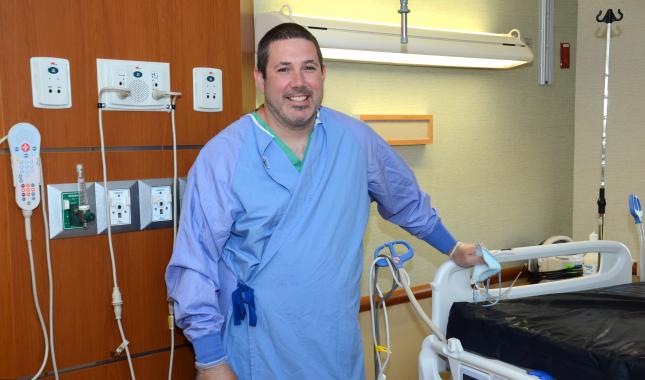“Every single department plays a vital role,” says Derick Deleski. “If one piece falls, the whole thing falls.”
As the overnight supervisor of a team of 27 Environmental Services employees, Derick has a unique perspective on just how interconnected and interdependent each hospital department is. During normal hospital operations, his team plays an essential role in infection control and prevention, cleaning and disinfecting operating rooms, the emergency department, and various subspecialty units. Today, their contributions to patient and staff safety have become even more critical.
At the height of the Covid-19 crisis, Good Samaritan Hospital provided care to more than 300 COVID patients. Thankfully, the sacrifice made by so many Long Islanders to stay home and flatten the curve paid off, and today the number of COVID patients requiring inpatient care is closer to 50.
In order to safely accommodate the influx of COVID patients, Good Sam had designated a number of units as COVID -only areas.
As these COVID units transition back to their original uses, Derick and his colleagues are the unsung heroes at the forefront of ensuring the safety of the staff and patients who will inhabit these areas in the future. In addition to their normal cleaning and disinfecting routine, Environmental Services personnel have taken on the task of performing a deep cleaning, known as “terminal cleaning,” on units that formerly housed COVID patients.
“Terminal cleaning involves cleaning every surface, all the equipment, all the flat surfaces and the walls with a disinfectant called Virex, which we leave on for five minutes to kill any virus,” Derick explained. “It is a huge, labor-intensive process.”
The process is even more demanding now because as COVID units are being converted back to non- COVID units, Derick and his co-workers are terminally cleaning each unit twice. The entire cycle could take up to 48 hours, or six 8-hour shifts, per unit to complete.
Derick explained how the department manages this Herculean task.
“We have a process,” he said. “We start in the patient rooms by taking the curtains down and sending them to be laundered. Then every surface is wiped down, including all equipment, the walls, all flat surfaces, and vents.”
Next the team focuses on the nurses’ station. Anything paper or porous is removed and discarded. Medications are removed from the med room, all of the equipment and supplies are removed from the clean utility room and those areas are cleaned. Once all the rooms are clean, the team strips and waxes the floors. Then they go back and clean the rooms a second time and hang new curtains. When they are done with all the rooms, they clean the hallway a second time, and finish by stripping and waxing the hallway floor.
The extra work was made all the more challenging by the fact that some Environmental Services Department workers were personally affected by COVID. Some were unable to work because they were considered too high risk; others had to stay home to care for loved ones. Yet Derick, who joined the hospital 18 years ago as a custodian and became overnight supervisor 11 years ago, is proud that the department pulled together as a team to get the job done.
“Sometimes we had to cover with overtime. Some shifts stayed over after working 3 – 11; others worked on their days off or came in early,” he said. “It’s been amazing, actually, how everyone stepped up.”
In the middle of this period, Derick and his wife, Melissa, a PA at Good Sam, became parents of a baby boy, Benjamin. Knowing first-hand how meticulously he and his colleagues clean the hospital was reassuring to the couple as they faced the prospect of delivering a baby during a pandemic.
“I oversee all the cleaning throughout the whole hospital. I know the precautions we have taken and I know that everything is clean. I know we are doing the right job,” he said.
To community members who may feel apprehensive about coming to the hospital for elective or emergency care, Derick offers reassurance from the front lines. “I understand people being nervous. I get it. But from someone who sees first-hand how we’re cleaning, I can tell you there’s no need to feel nervous.”

